Marine Life & Conservation
The Maldivian Coral Carers – An insight into Active Coral Restoration Techniques
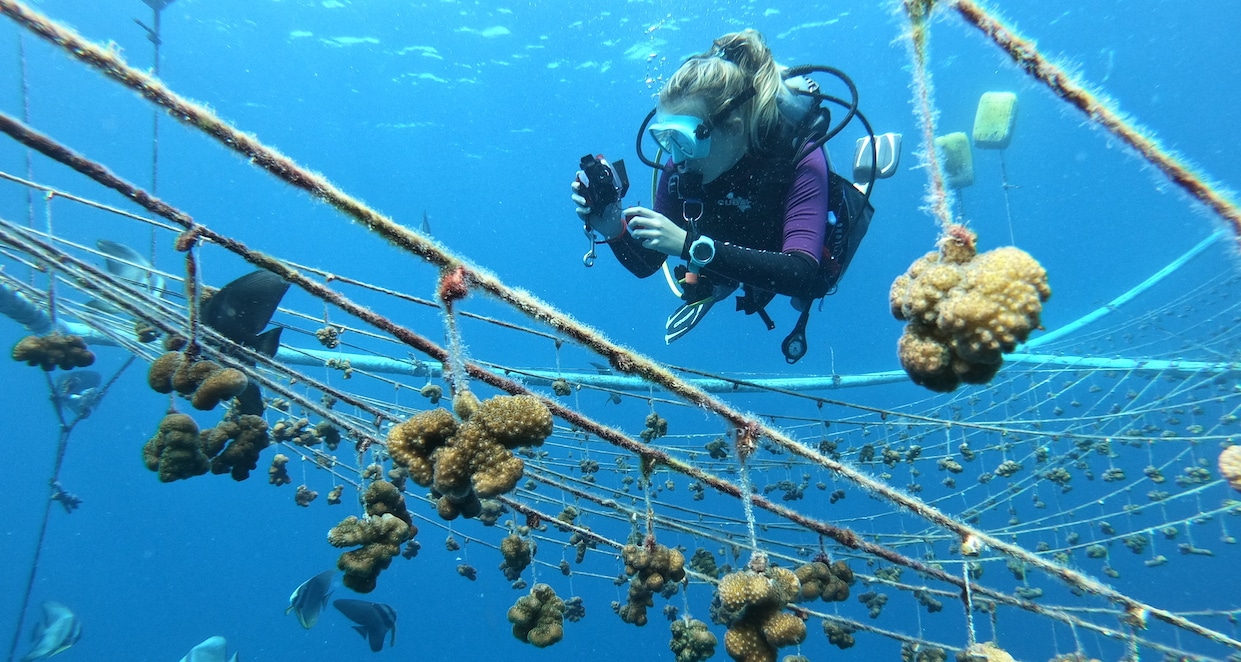
A guest post for Scubaverse by Chloe Brown.
Chloe is a graduate from the University of Southampton where she studied for a BSc Oceanography. She started her diving career whilst studying, which led to her current job working for Velaa Private Island in the Maldives. Chloe works together with the resident marine biologist and coral biologist restoring the house reef while conducting new innovative research to improve restoration techniques.
The reality of climate change beneath the waves is more detrimental than the majority are aware. Among all the reefs found across the globe, 50% have been destroyed in recent years in response to anthropogenic stressors. Unfortunately, these beautiful habitats are tucked away and the effects easily go unnoticed, deteriorating further. This is not the case for the diving community who are unfortunately witnessing this rapid decline in corals and marine life. Therefore, multiple restoration efforts worldwide have jumped in to attempt to restore one of the world’s greatest wonders, before it is too late.
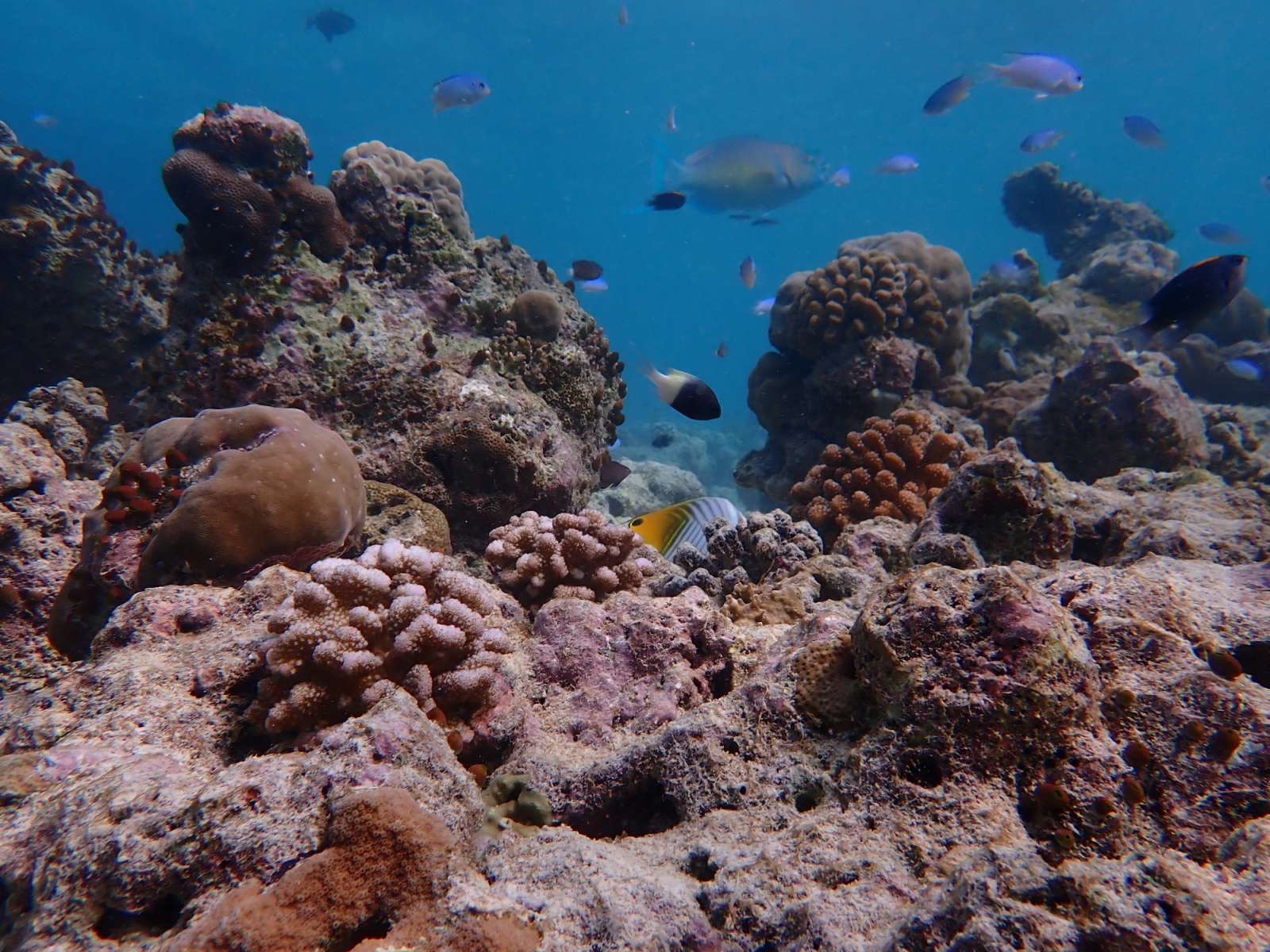
Restoration Techniques
Coral restoration initiatives aim to restore the overall health, abundance, and biodiversity improving the reef’s tolerance to external stressors. The process behind this is to utilize the existing corals to clone them and repopulate the reef. The fact these corals are still surviving on the reefs, despite the natural disturbances, indicates strong resilient characteristics that are very valuable to restoration projects. These corals act as “donor colonies” as small fragments are broken off to be grown in nurseries and later transplanted back onto the reef.
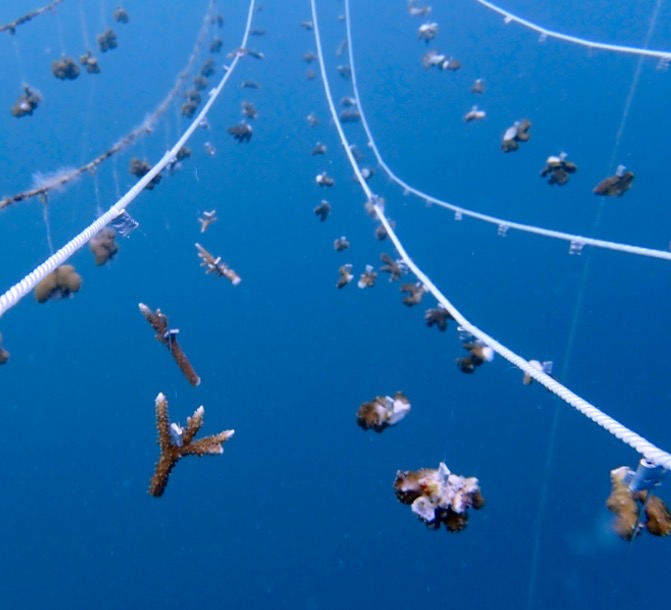
Here at Velaa Private Island, we use the floating mid-water nursery set up. These consist of 1,500 corals and we currently have two of these nurseries in place. Our nurseries mainly hold Pocillopora spp. as it is extremely tolerable with a high prevalence rate. We attach the small fragments taken from the donor colonies with monofilament and crimps to the nurseries, where they grow for a year. This nursery is situated at a depth of 8m (anchored at 30m) and located away from the reef. Growing away from the reef reduces predation, moderates competition, and allows depth alterations during warmer months to mitigate bleaching effects. Other key nursery designs are being trialed by other restoration efforts worldwide. These include coral trees, net nurseries, and ex-situ nurseries in laboratories, where the conditions can be monitored and controlled 24 hours a day.
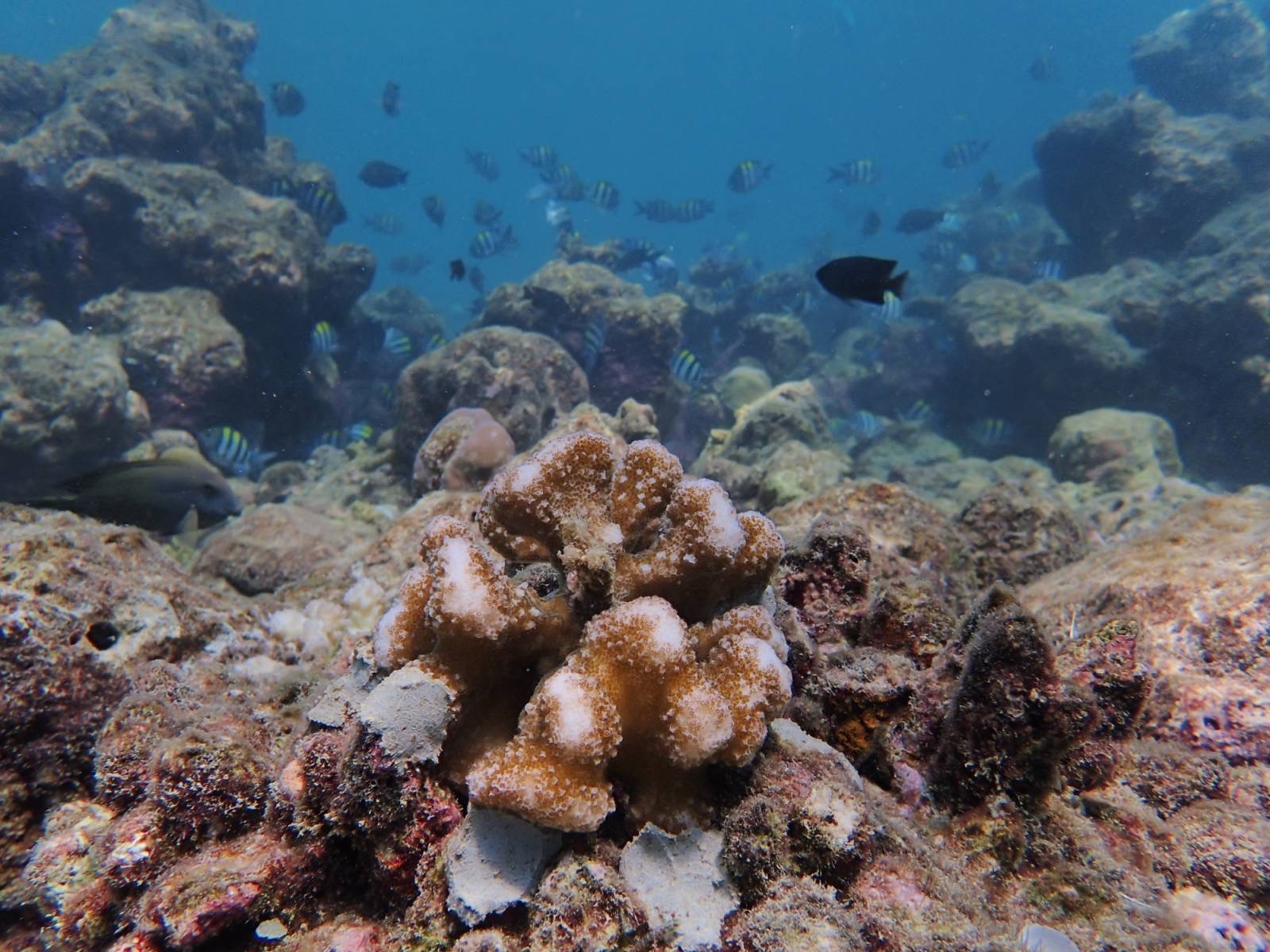
During transplantation, we use marine cement to attach the corals to rocks and other hard surfaces found along the reef. Over time these corals will propagate outwards via asexual reproduction growing over the adhesives securing themselves on to the reef.We have successfully transplanted over 4,500 corals with a 70% survival rate. This has had a great effect on increasing the abundance and diversity of marine life present on the reef.
We have additionally conducted further research into effective ways to restore species diversity, specifically looking at massive species. It was found that massive coral species survive better when the fragments are transplanted directly onto the reef, skipping the nursery phase entirely. The ideal fragment size should be 1-2cm and attached to the substrate 1cm away from its clones, to allow fusion with growth. It was Dr. Vaughn who discovered that massive coral species grow quicker when they are cut into smaller fragments. He also discovered tissue fusion between clones however, his finding was taken from ex-situ experiments. It’s fantastic to see similar results in-situ with all the natural disturbances prevailing. The overall aim of restoration is to rehabilitate the reefs encouraging natural growth and self-sufficiency. We have certainly seen this as there was higher recruitment (coral larvae settlement) number in the transplant sites compared to the untouched degraded sites. Self-generation has been evident.
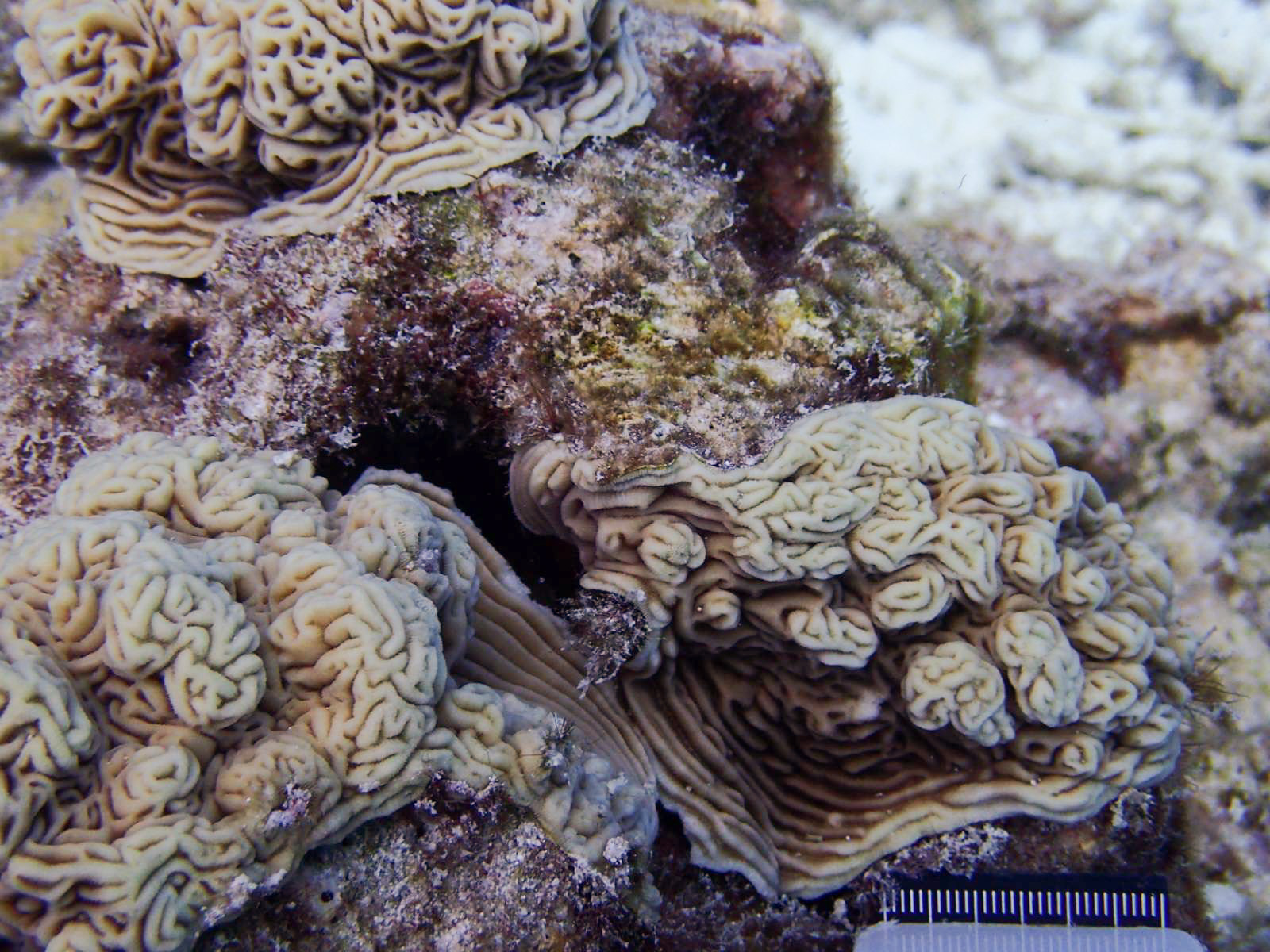
This is an insight into a few techniques used by restoration projects. Without reef restoration, it is predicted that a complete loss of coral reefs will be seen in the next 30 years, taking away, the home to 25% of all marine life. This signifies the importance of restoration and future conservation measures. To ensure the sustainability of restoration efforts education and awareness need to be conducted. Awareness needs to be ubiquitous as it is not just those living along the coasts who have an impact on the oceans, it’s everyone. People need to be taught about the reality of the ocean to induce a permanent change; otherwise coral reefs will lose the fight against mankind taking the marine life with it.
If you are interested in the work we are doing or just want to see some awesome underwater shots of marine life check out our Instagram page @velaacoralproject. We will be delighted to have you.
Marine Life & Conservation
Double Bubble for Basking Sharks

 The Shark Trust is excited to announce that, for two more days only, all donations, large or small, will be doubled in the Big Give Green Match Fund!
The Shark Trust is excited to announce that, for two more days only, all donations, large or small, will be doubled in the Big Give Green Match Fund!
Donate to Basking in Nature: Sighting Giants
The Shark Trust is hoping to raise £10k which will be doubled to £20k. This will go towards Basking in Nature: Sighting Giants. And they need YOUR help to reach they’re goal.
The Shark Trust’s citizen science project is to monitor and assess basking sharks through sightings; encouraging data collection, community engagement, and promoting nature accessibility. This initiative aims to enhance health and wellbeing by fostering a deeper connection with British Sharks.
Campaign Aims
- Increase citizen science reporting of Basking Sharks and other shark sightings to help inform shark and ray conservation.
- Provide educational talks about the diverse range of sharks and rays in British waters and accessible identification guides!
- Create engaging and fun information panels on how to ID the amazing sharks and rays we have on our doorstep! These can be used on coastal paths around the Southwest. With activities and information on how you can make a difference for sharks and rays!
- Promote mental wellbeing through increasing time in nature and discovering the wonders beneath the waves!
Donate, and double your impact. Click Here
Marine Life & Conservation
Leading UK-based shark conservation charity, the Shark Trust, is delighted to announce tour operator Diverse Travel as a Corporate Patron

 Corporate Patrons provide a valuable boost to the work of The Shark Trust. The Trust team works globally to safeguard the future of sharks, and their close cousins, the skates and rays, engaging with a global network of scientists, policymakers, conservation professionals, businesses and supporters to further shark conservation.
Corporate Patrons provide a valuable boost to the work of The Shark Trust. The Trust team works globally to safeguard the future of sharks, and their close cousins, the skates and rays, engaging with a global network of scientists, policymakers, conservation professionals, businesses and supporters to further shark conservation.
Specialist tour operator Diverse Travel has operated since 2014 and is committed to offering its guests high quality, sustainable scuba diving holidays worldwide. Working together with the Shark Trust will enable both organisations to widen engagement and encourage divers and snorkellers to actively get involved in shark conservation.
“Sharks are truly at the heart of every diver and at Diverse Travel, we absolutely share that passion. There is nothing like seeing a shark in the wild – it’s a moment that stays with you forever!” says Holly Bredin, Sales & Marketing Manager, Diverse Travel.
“We’re delighted to celebrate our 10th year of business by becoming a Corporate Patron of the Shark Trust. This is an exciting partnership for Diverse and our guests. We will be donating on behalf of every person who books a holiday with us to contribute towards their vital shark conservation initiatives around the world. We will also be working together with the Trust to inspire divers, snorkellers and other travellers to take an active role – at home and abroad – in citizen science projects and other activities.”
Paul Cox, CEO of The Shark Trust, said:
“It’s an exciting partnership and we’re thrilled to be working with Diverse Travel to enable more divers and travellers to get involved with sharks and shark conservation. Sharks face considerable conservation challenges but, through collaboration and collective action, we can secure a brighter future for sharks and their ocean home. This new partnership takes us one more valuable step towards that goal.”
For more information about the Shark Trust visit their website here.
For more about Diverse Travel click here.
-

 News3 months ago
News3 months agoHone your underwater photography skills with Alphamarine Photography at Red Sea Diving Safari in March
-

 News3 months ago
News3 months agoCapturing Critters in Lembeh Underwater Photography Workshop 2024: Event Roundup
-

 Marine Life & Conservation Blogs3 months ago
Marine Life & Conservation Blogs3 months agoCreature Feature: Swell Sharks
-

 Blogs2 months ago
Blogs2 months agoMurex Resorts: Passport to Paradise!
-

 Blogs2 months ago
Blogs2 months agoDiver Discovering Whale Skeletons Beneath Ice Judged World’s Best Underwater Photograph
-

 Gear Reviews2 weeks ago
Gear Reviews2 weeks agoGEAR REVIEW – Revolutionising Diving Comfort: The Sharkskin T2 Chillproof Suit
-

 Marine Life & Conservation2 months ago
Marine Life & Conservation2 months agoSave the Manatee Club launches brand new webcams at Silver Springs State Park, Florida
-

 Gear Reviews3 months ago
Gear Reviews3 months agoGear Review: Oceanic+ Dive Housing for iPhone






